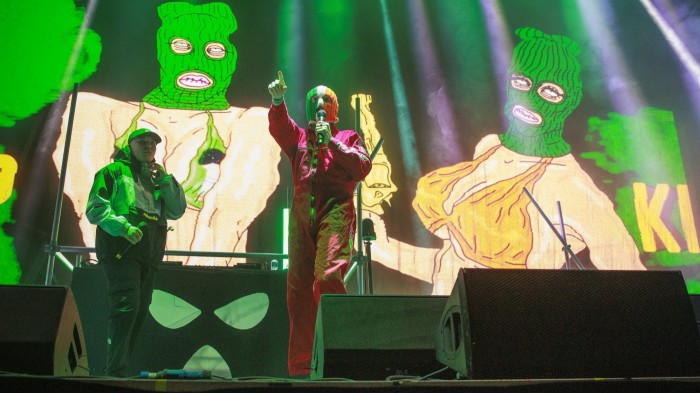With sold-out shows and an award-winning hit film, Belfast rap group Kneecap have become the standard-bearers of a new contemporary Northern Ireland. Now they face their toughest gig yet: a high profile London court appearance.
Band member Liam Óg Ó hAnnaidh, 27 — who performs under the stage name Mo Chara, meaning “My Friend” in Irish — is due to appear before Westminster Magistrates’ Court on Wednesday for a preliminary hearing over a terrorism charge.
It relates to his display of a flag allegedly in support of Lebanese militant group Hizbollah at a concert in London last year, one of many instances in which the Irish band have displayed their proudly pro-Palestinian politics.
In typically provocative style, Kneecap have branded the hearing a “little court date”, emblazoned their X profile with the banner “Free Mo Chara” — even though he is not currently detained. They vowed: “We will fight you in your court. We will win.”

The band rap — largely in Irish — about republicanism, drugs and working-class culture with a hefty dose of satire and a punk-like energy.
They have been controversial, particularly in Westminster. UK Prime Minister Sir Keir Starmer has said some of the band’s political comments were “completely unacceptable”, while Conservative leader Kemi Badenoch blocked public funding to them while a government minister.
Love them or loathe them — and many locals fall viscerally into one or the other camp — “they have got people talking about Northern Ireland — it’s good we’ve finally got recognition,” said Jack Magennis, an 18-year-old student at a Catholic school in Belfast.
“It shows there is good new stuff going on — we’ve had nothing new or famous [from here] in a very long time,” agreed classmate Ultan Rooney.
John Nagle, a sociology professor at Queen’s University in Belfast, said the band have a “playfulness and are shining a light on creativity here which has often been neglected because of the three decades-long Troubles conflict and the fact this still is a divided society here”.

The band takes its name from the much reduced — though still continuing — practice of punishment beatings and shootings.
In Belfast and across Northern Ireland, the scars of the conflict are still visible, from largely segregated schooling and so-called peace walls dividing some Protestant and Catholic areas, to the continued existence of shadowy paramilitary groups now active in drugs and racketeering.
Racially motivated rioting that last week broke out in largely-Protestant areas only reinforced the identity politics of a region created in 1921 by partition, and originally intended to be a permanent Protestant enclave.
But Catholics now outnumber Protestants, and support for a united Ireland is growing. Among voters aged under 35, support for reunification eclipses the desire to stay in the UK, according to a recent Lucid Talk poll.
The band’s messaging taps into this, commentators say. “Kneecap are seen among young people as being really cool and edgy, countercultural,” said Sarah Creighton, a unionist commentator. “Unionism just doesn’t have that . . . unionism is for Boomers . . . it’s just very stale, conservative — I think because for so long it was the de facto thing.”

The tracksuit-clad trio have also fuelled a growing interest in the Irish language — even among some Protestants.
“A lot of kids would see them as attractive, loving their rebelliousness, the party lifestyle, living the dream,” said Stephen Hughes, who runs a youth club in a nationalist area of Belfast.
But he praised them for “bringing to the fore some big current issues that aren’t on the agenda, like poverty, segregation, sectarianism, hurt and pain, deprivation . . . this is what Kneecap have done — they’ve brought an opportunity to talk about identity”.
Kneecap are brash and opinionated but illustrate how young people have a more nuanced view of the old divides.
After winning a legal battle against the UK government over arts funding — reversing a move by Badenoch to cut off taxpayer support — Kneecap gave the money to cross-community groups.
The judge will decide on Wednesday whether to continue bail and Ó hAnnaidh may indicate how he intends to plead.
Being denied bail would imperil the band’s upcoming performance at the Glastonbury festival later this month.
Hizbollah is a banned group in the UK, and expressing support for them is a crime.

Despite their growing popularity, not all young people in nationalist areas love them. “I wouldn’t lean into their “get the Brits out” Republican stance — they can be very performative,” said Conor Stewart, another student.
But Gareth Spence, a Protestant rapper known as Young Spencer, who supported Kneecap at a concert last year, said they had helped blur boundaries in a region where “we grow up feeling like we’re not enough”.
Kneecap have assembled a high profile legal team, including Gareth Peirce — who defended the Birmingham Six and the Guildford Four who were wrongly imprisoned for IRA bombings — and Blinne Ní Ghrálaigh, a barrister who argued South Africa’s case against Israel at the International Court of Justice.
Spence said he hoped Ó hAnnaidh, who was charged under the English version of his name, Liam O’Hanna, would not be convicted.
“He should be out here inspiring people, impacting people.”




